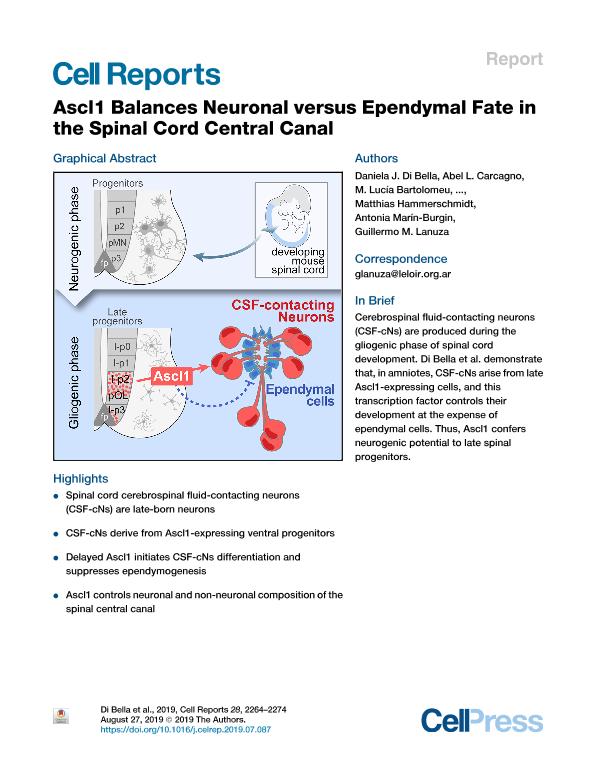Artículo
Ascl1 Balances Neuronal versus Ependymal Fate in the Spinal Cord Central Canal
Di Bella, Daniela Jesica ; Carcagno, Abel Luis
; Carcagno, Abel Luis ; Bartolomeu, M. Lucía; Pardi, Belén
; Bartolomeu, M. Lucía; Pardi, Belén ; Löhr, Heiko; Siegel, Nicole; Hammerschmidt, Matthias; Marin Burgin, Antonia
; Löhr, Heiko; Siegel, Nicole; Hammerschmidt, Matthias; Marin Burgin, Antonia ; Lanuza, Guillermo Marcos
; Lanuza, Guillermo Marcos
 ; Carcagno, Abel Luis
; Carcagno, Abel Luis ; Bartolomeu, M. Lucía; Pardi, Belén
; Bartolomeu, M. Lucía; Pardi, Belén ; Löhr, Heiko; Siegel, Nicole; Hammerschmidt, Matthias; Marin Burgin, Antonia
; Löhr, Heiko; Siegel, Nicole; Hammerschmidt, Matthias; Marin Burgin, Antonia ; Lanuza, Guillermo Marcos
; Lanuza, Guillermo Marcos
Fecha de publicación:
08/2019
Editorial:
Elsevier
Revista:
Cell Reports
ISSN:
2211-1247
Idioma:
Inglés
Tipo de recurso:
Artículo publicado
Clasificación temática:
Resumen
Generation of neuronal types at the right time, location, and number is essential for building a functional nervous system. Significant progress has been reached in understanding the mechanisms that govern neuronal diversity. Cerebrospinal fluid-contacting neurons (CSF-cNs), an intriguing spinal cord central canal population, are produced during advanced developmental stages, simultaneous with glial and ependymal cells. It is unknown how CSF-cNs are specified after the neurogenesis-to-gliogenesis switch. Here, we identify delayed Ascl1 expression in mouse spinal progenitors during the gliogenic phase as key in CSF-cN differentiation. With fate mappings and time-controlled deletions, we demonstrate that CSF-cNs derive from Ascl1-expressing cells and that Ascl1 triggers late neurogenesis in the amniote spinal cord. Ascl1 abrogation transforms prospective CSF-cN progenitors into ependymocytes. These results demonstrate that late spinal progenitors have the potential to produce neurons and that Ascl1 initiates CSF-cN differentiation, controlling the precise neuronal and nonneuronal composition of the spinal central canal.
Archivos asociados
Licencia
Identificadores
Colecciones
Articulos(IIBBA)
Articulos de INST.DE INVEST.BIOQUIMICAS DE BS.AS(I)
Articulos de INST.DE INVEST.BIOQUIMICAS DE BS.AS(I)
Citación
Di Bella, Daniela Jesica; Carcagno, Abel Luis; Bartolomeu, M. Lucía; Pardi, Belén; Löhr, Heiko; et al.; Ascl1 Balances Neuronal versus Ependymal Fate in the Spinal Cord Central Canal; Elsevier; Cell Reports; 28; 9; 8-2019; 2264-2274.e3
Compartir
Altmétricas



